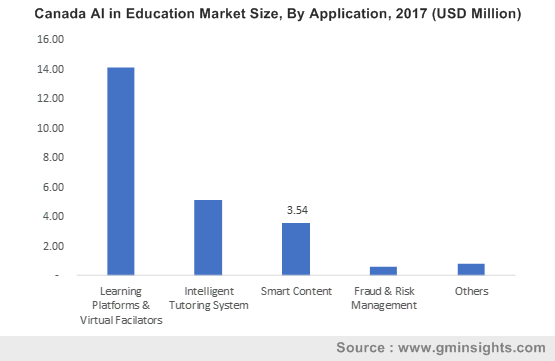Artificial Intelligence (AI) in Education Market to derive massive proceeds via higher education sector and deployment of learner model, global industry to register a staggering 45% CAGR over 2018-2024
Publisher : Fractovia | Published Date : July 2018Request Sample
The success of iTalk2Learn is an appropriate instance that underlines the massive potential held by Artificial Intelligence (AI) in education market. The European collaborative project had been instituted with an intention to develop an open-source intelligent tutoring platform that facilitates learning mathematics for young students. The interdisciplinary project pooled in expertise from educational psychology, natural language processing, intelligent tutoring systems, user modelling, and machine learning to build a platform that would support mathematics learning in an efficient way. The outcomes of such collaborations have been highly encouraging and have eventually boosted the growth prospects of AI in education industry in the recent past.
Speaking in the similar context, the popularity of learner models in the AI in education market has been on the rise lately. The valuable information about the achievements of learners, analysis of their affective state, or any misconceptions that they held has subsequently assisted teachers in comprehending the learning approaches students adopt. Deep analysis of the student’s interactions is being used to update the learner model as accurate estimates of the student’s current motivation and comprehension state ensure that learning experiences are tailored to their capabilities and needs, and effectively support their learning.
U.S. Artificial Intelligence in Education Market Share, By End-Use, 2017 (USD Million)

The learner model essentially represents the interactions between students and teachers or virtual tutors that are then utilized to optimize the engagement capabilities of students to improve their learning outcomes. These models motivate learners by enabling them to track their own progress and encourage them to reflect on their learning. Needless to mention, the many benefits of learner model has led prominent AI in education industry giants to focus on enhancing the effectiveness of this segment which held more than 60 percent revenue share in the overall model landscape of AI in education market in 2017, claim reliable estimates.
Higher education sector to retain top position across the end-use segment of AI in education industry
Evidently, the integration of AI in teaching methodologies of the institutes imparting higher education has facilitated implementation of a more rigorous and enhanced academic standards in the recent years. The complex and intricate tasks such as counselling career path options to students, administrative management, formulating personalized learning frameworks, and provisioning of smart classrooms has been made easier with the aid of AI.
With an aim to enhance the affordability and quality of education for all, it has been observed that several leading firms partaking in AI in education market have been collaborating with schools, educational content publishers, universities, and online training platforms in the past few years. The recent partnership effected between Colorado State University (CSU) and Cognii Inc. is a significant instance that aptly depicts the transformation being brought about by AI in education industry across the global learning scenario. Regarded as one of the foremost public research university in the U.S., the faculty at CSU would work hand in hand with Cognii to build a new learning and assessment experience by deploying the Virtual Learning Assistant (VLA) technology.
Elaborating further, the VLA technology of Cognii utilizes Natural Language Processing and conversational AI technologies to engage students through a smart tutoring system. It further assesses open response answers of the students with a qualitative natural language feedback that trains them to attain conceptual expertise. It is quite imperative to mention that the VLA has been predominantly formulated to enhance the learning outcomes and knowledge retention abilities of the students, facilitate high-quality personalized education at a wider scale, and improve the productivity of instructors.
Apparently, the development of such cutting-edge pedagogical assessment tools and instructional practices has assisted higher education sector to apportion a humongous share of the remuneration portfolio of the overall AI in education industry. In fact, as per a research report compiled by Global Market Insights, Inc., higher education sector accounted for more than 50 percent share of the total AI in education market valuation in the year 2017.
As the education systems across the globe evolve over the ensuing years, the need to leverage the advantages of AI would undeniably turn out to be of immense significance. The deployment of AI in education systems has enabled a pedagogically superior form of constructed response assessment and provided a transformative way of learning in a cost-effective manner - a factor that would vigorously propel the AI in education market expansion in the years to come.